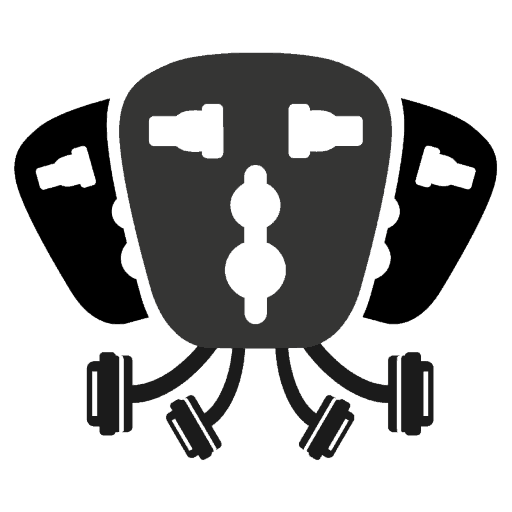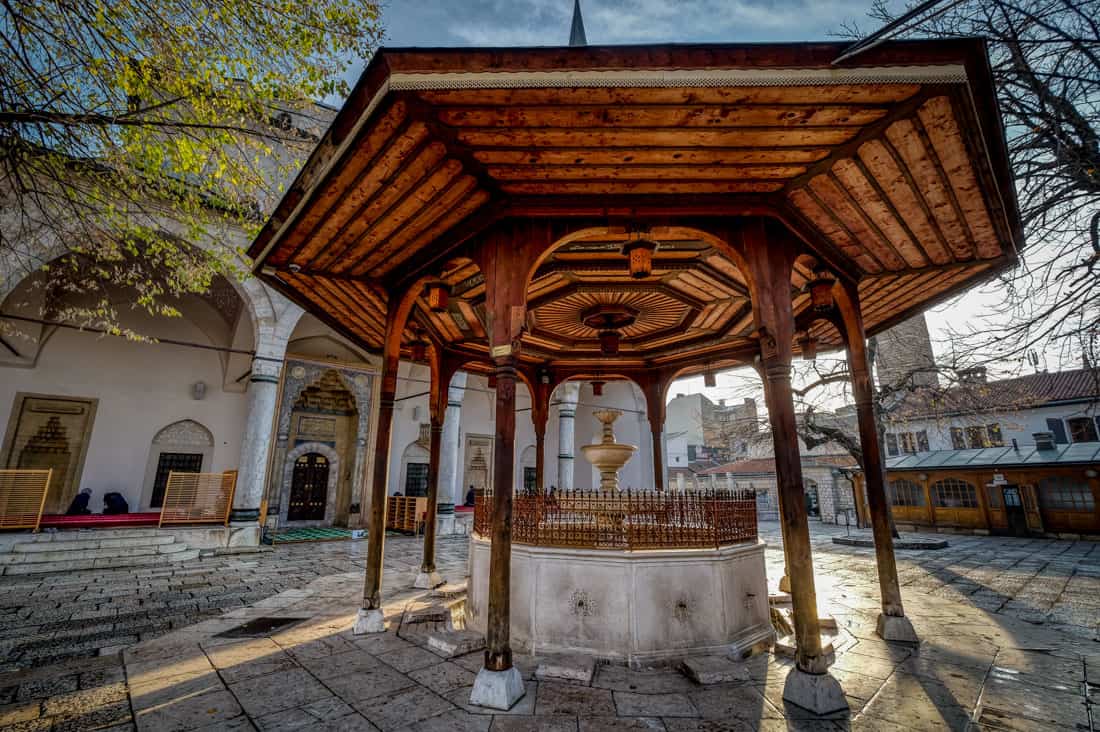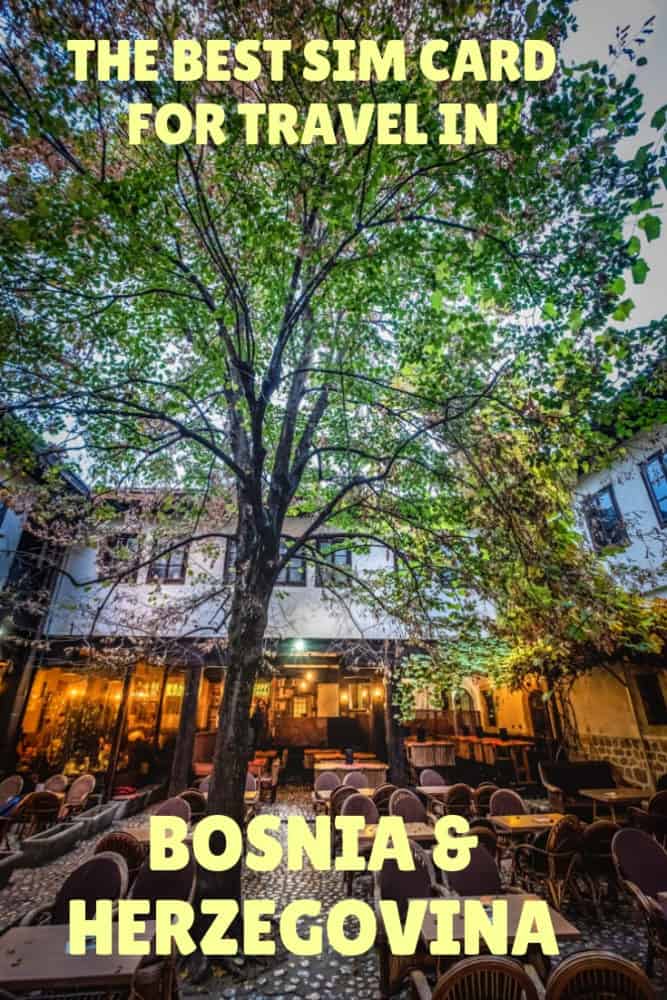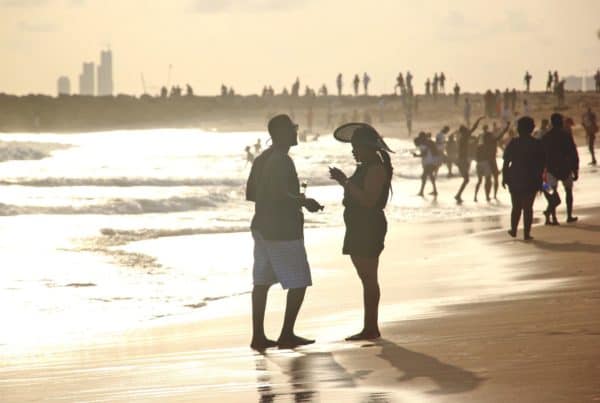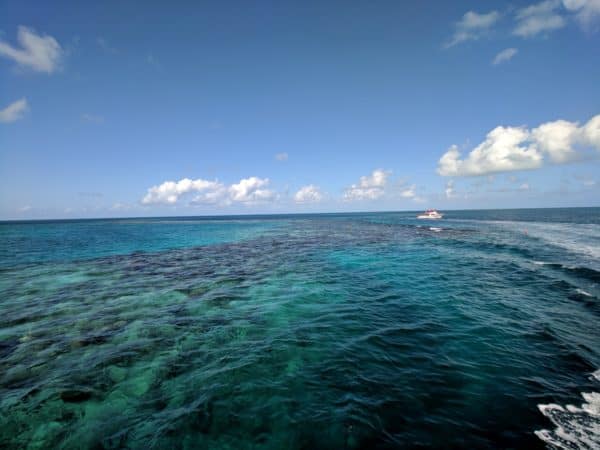Buying a SIM Card or eSIM in Bosnia and Herzegovina
We may earn a commission from purchases you make after clicking links on this site. Learn more.Traveling through Bosnia feels like walking through a history book. Ottoman empire influences can be seen in the architecture, food, and religion, as can remnants of the war in the 1990s.
Abandoned buildings full of bullet holes are a common sight in towns and cities, and cemeteries dot surrounding areas.
Islam is the main religion, but there’s a healthy Christian minority, with many other religions also having a presence. Each of these has added to the local culture, and from a tourist perspective at least, appear to coexist with little tension.
Churches and mosques sit in close proximity. Walking around you hear church bells alongside the Muslim call to prayer. All this adds to the unique flavor of a truly European, albeit primarily Muslim, country.
Bosnia generally isn’t a costly place to visit, but being there in November made things even cheaper. Going out of season also meant I had the walk down Sarajevo’s famous 1984 Olympic Bobsled track almost to myself.
If you want to stay connected, SIM cards are easy to buy in almost every grocery store, news stand, and post office. I found the prices to be very low, even compared to other inexpensive countries like Poland and Hungary.
Travel eSIMs are another good option, and require even less effort than the minimal amount needed to find, buy, and install a physical SIM. Prices are also low, especially if you don’t need a huge amount of data.
However you choose to stay connected, here’s what you need to know.
Companies
There are three main service providers in Bosnia, collectively covering around 90% of the country. 4G/LTE service was late arriving, but is now widely available in urban areas and many parts of the countryside. There’s no 5G yet.
The main providers are:
• BH Telecom, with a little over 40% market share
• M:tel also has around 40% of the market
• HT ERONET makes up the other ~20%
Many resellers are also available. I didn’t look into their packages closely, as I prefer using a primary service provider. The main companies are inexpensive in Bosnia anyway, and I didn’t want to waste time researching the small guys.
I chose BH Telecom based on the recommendation of staff at the hostel I stayed at. They have specific tourist plans with generous features for low prices, and the company generally has the strongest connection and best speeds within Sarajevo.
Need travel insurance for Bosnia?
Need travel insurance for Bosnia?
Note that Bosnia isn’t part of the EEA, so you don’t get free EU roaming there. It is part of the Balkan Roaming Zone, however, so you can use Bosnian SIM cards in Albania, Montenegro, Serbia, Kosovo, and (North) Macedonia for free or at a capped rate.
Likewise, if you already have a SIM card from any of those countries, you can continue using it in Bosnia at those lower rates.
Note that you do need a small amount of credit on your account to be able to roam in other Balkan countries, so you may need to add it separately after buying your tourist plan.
Travel eSIM for Bosnia
Bosnia isn’t as well-served by travel eSIM companies as some countries, but there are still good options. Both aloSIM and Airalo have a range of well-priced data packs available: they’re two of my favorite eSIM companies anyway, so that works for me.
You’ll get better value for larger amounts of data with a physical tourist SIM, but for smaller packs, you’ll save money (and time) with an eSIM. I’ve found that in general, if you need less than about 5GB of data, it’s cheaper to go with an eSIM.
As with most travel eSIMs, they’re data-only, and don’t come with a local number. I use apps for everything from transport to communication these days, so it doesn’t affect me at all, but bear it in mind if you’ll need to be called by locals in Bosnia.
If you’re new to eSIMs, they offer big benefits to travelers in terms of how quickly, easily, and (often) cheaply you can get connected when you arrive in a new country. Most recent phones support them, and you can read all about them here.
How to Buy a Prepaid SIM Card in Bosnia
I entered Bosnia by bus, arriving at the main station in Sarajevo. I didn’t see a kiosk to buy SIM cards there, but there is a newsstand selling them beside the tram station, about a five-minute walk away. Unless you’re taking a taxi or Uber to your accommodation, you’ll likely end up at the tram station anyway.
SIM cards don’t require registration in Bosnia, so no passport or other ID is required to buy them. They’re available at newsstands, the post office, bookstores, and telecom stores. Honestly, Bosnia is the easiest place I’ve ever bought a SIM.
I searched for a store location for BH Telecom, and Google Maps took me to the corporate office… where they don’t actually sell SIM cards. Thanks, Google. One of the front desk employees, a cool guy named Read (Re-ad), helped me out.
He walked me to the nearest convenience store and hung out with me until I got the card set up. I’d planned to buy the Ultra Tourist 1 package, but the clerk at the store introduced me to the Ultra Starter plan instead. It was cheaper and still met my needs, so I went for that instead.
The setup process was super easy. After inserting the SIM, I entered the PIN code (which according to Read is apparently 0000 for almost every SIM in the country,) and received a text almost immediately saying the card was set up.
A little later, however, I noticed I only had a partial connection. Messenger worked, for example, but Google Maps didn’t. The next day I popped into one of BH Telenor retail stores and mentioned my issue. The representative made a few changes to my APN, and voila, 30 seconds later, everything worked.
Prepaid SIM and eSIM Costs
BH Telecom
BH Telecom’s tourist plans are the most-recommended options for visitors, with a small range of features and validity periods.
Ultra Tourist 1 costs 20 KM ($11 USD), and includes 15 GB data and 5 KM for voice and text credit, valid for 10 days. You also get a bonus 5GB of data with your initial purchase. Just under 4GB of data can be used while roaming in the Western Balkans.
Ultra Tourist 2 doubles everything and lasts longer. There’s 30 GB data, 10 KM of voice and text credit, ~8GB of roaming data, and it costs 40 KM ($22.) It’s valid for 30 days. Again, you get an extra 5GB of data as a bonus.
Finally, there’s a 100GB Unlimited pack that’s clearly aimed at visiting digital nomads: it even says so on the pack. Again, you get 5GB of bonus data, and a bit over 19GB for roaming. There are no calls or texts included, but you can add credit to get them.
At the time, there was a small Starter pack (shown below), which is the one I bought. It’s since been discontinued, unfortunately: it was a good option for short visits.
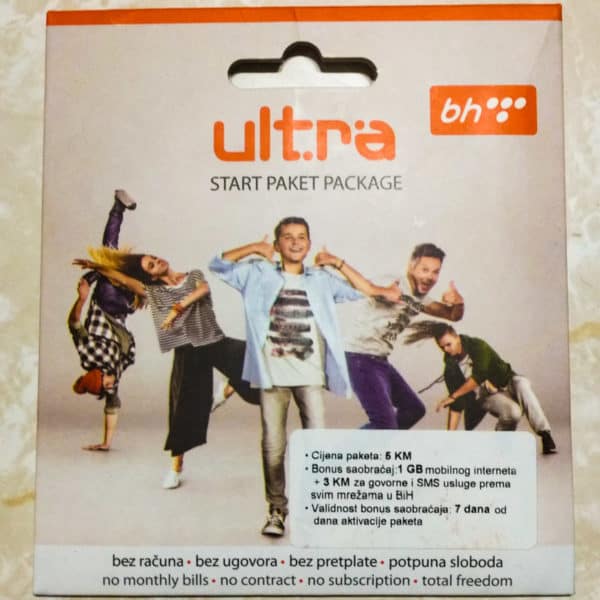
aloSIM and Airalo
Pricing is typically identical between Airalo and aloSIM: I’ve used both in various countries and always been happy with the service, so it doesn’t make much difference which one you go for. Here’s where things stand price-wise right now.
Topping Up
BH Telecom
You can top up anywhere you find SIM cards, which as mentioned, is pretty much everywhere. Various options are available, starting at 1 KM ($0.60). Topups are valid for between 7 and 180 days, depending on the amount purchased.
You can also add data bundles to your tourist SIM, ranging from 10-50GB.
- 10GB costs 15 KM (valid for 10 days)
- 30GB costs 35 KM (valid for 30 days)
- 50GB costs 50KM (valid for 30 days)
To buy them, you just top-up with a voucher that covers the full amount, and then dial one of the codes shown here to buy the data bundle.
The BH website claims you can top up the Ultra plans at ATM’s for UniCredit Bank and Raiffeisen Bank, though I never tried it. I didn’t see any way to top up online using a credit card.
aloSIM or Airalo
Topping up with aloSIM or Airalo is done by logging into the website or app. You just select your Bosnia eSIM, hit the top-up button, and buy the same package again.
The top-up packs have exactly the same pricing and duration as the original eSIMs: there’s little difference between topping up your current eSIM and buying a new one, other than not having to activate it.
Get regular updates from the world of travel tech and remote work
News, reviews, recommendations and more, from here and around the web
Coverage and Data Speeds
My data speeds weren’t mind-blowing, but they were usable. I got good LTE speeds in downtown Sarajevo, but had slower 3G (shown below) when I was at my hostel in the east of the city.
On the trip from Sarajevo to Gradiska (beside the Croatian border), coverage disappeared in mountainous areas, but everywhere else was no problem.
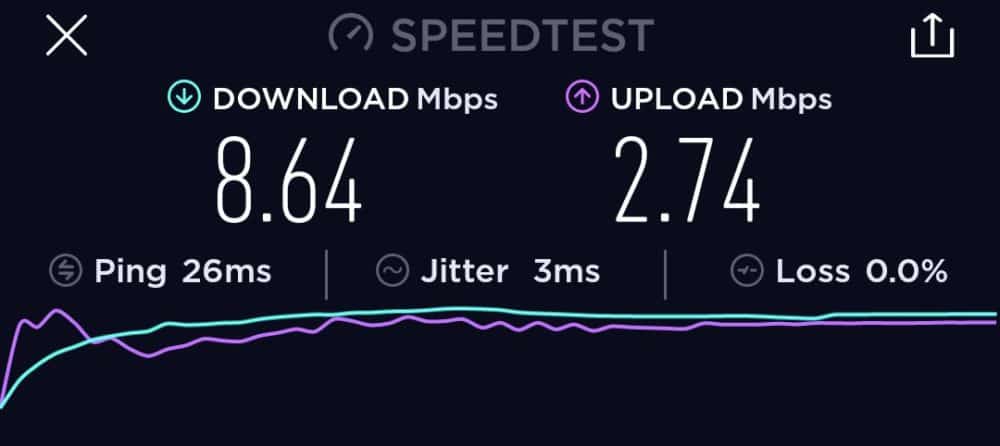
Both aloSIM and Airalo use the Eronet network, which works well in urban centers like Sarajevo and Mostar, but isn’t as widespread in rural areas. That’s unlikely to be a problem for most visitors, but something to consider if you’re going somewhere remote.
Check out our guides to SIM cards and eSIMs in 65+ other countries here.
